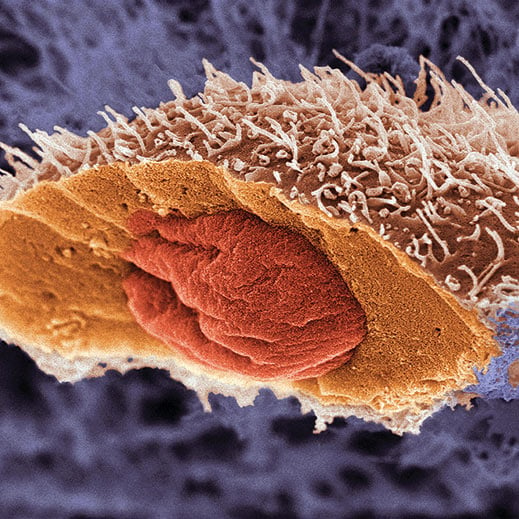A typical cancer cell has hundreds of mutated genes, but only a handful, known as drivers, are responsible for cancerous traits such as uncontrolled growth. Biologists have largely ignored the other mutations, believing they had little or no impact on cancer progression.

But a recent study from MIT, Harvard University, the Broad Institute, and Brigham and Women’s Hospital revealed, for the first time, that these so-called passenger mutations are not just along for the ride. When enough of them accumulate, they can slow or even halt tumor growth.
The findings suggest that cancer should be viewed as an evolutionary process whose course is determined by two opposing forces: driver-propelled growth and the gradual buildup of passenger mutations that inhibit tumors, says the paper’s senior author, Leonid Mirny, an associate professor of physics and of health sciences and technology. Furthermore, the researchers say, drugs that tip the balance in favor of the passenger mutations could offer a new way to treat cancer by beating it with its own weapon—mutations.
Although the influence of a single passenger mutation is minuscule, “collectively they can have a profound effect,” Mirny says. “If a drug can make them a little bit more deleterious, it’s still a tiny effect for each passenger, but collectively this can build up.” Computer simulations demonstrated that boosting the impact of deleterious mutations could force tumors to shrink even when individual passengers affect tumor growth rates by only a fraction of a percent.
Cancer can take years or even decades to develop as cells gradually accumulate the necessary driver mutations, which promote cell growth or turn off tumor-suppressing genes. In a computer simulation of cancer cell growth, Mirny’s team showed that many passenger mutations arose during the long periods between acquisition of driver mutations. When one cancerous cell gains a new driver mutation, that cell and its progeny take over the entire population, bringing along all the original cell’s baggage of passenger mutations.
If enough deleterious passengers accumulate, tumors may become dormant or even shrink, but growth can start up again if new driver mutations are acquired. This could explain the cancer growth patterns often seen in human patients. “The load of deleterious passenger mutations may be one of the causes of spontaneous and chemotherapy-induced remissions,” Mirny says.
Keep Reading
Most Popular
Large language models can do jaw-dropping things. But nobody knows exactly why.
And that's a problem. Figuring it out is one of the biggest scientific puzzles of our time and a crucial step towards controlling more powerful future models.
How scientists traced a mysterious covid case back to six toilets
When wastewater surveillance turns into a hunt for a single infected individual, the ethics get tricky.
The problem with plug-in hybrids? Their drivers.
Plug-in hybrids are often sold as a transition to EVs, but new data from Europe shows we’re still underestimating the emissions they produce.
Stay connected
Get the latest updates from
MIT Technology Review
Discover special offers, top stories, upcoming events, and more.